 Beans Coffee Roastery
Beans Coffee Roastery
Boutique Coffee Roaster
roasting•menu
•COFFEE•
Blends
PREMIUM
A medium to full-bodied coffee with a nutty aroma and flavour, to be enjoyed any time of the day. Includes coffees from Columbia, Brazil, Ethiopia, and Papua New Guinea. Our flagship Premium Coffee Blend is recognizable by the smooth finish and full flavour, an ideal espresso coffee.
SWISS WATER DECAF
The SWISS WATER® Process PREMIUM ESPRESSO BLEND
This Water Decaffeinated Coffee (not chemical) contains a blend of premium coffees selected for blending characteristics. What makes this blend stand out is its strong combination of bold aroma and flavor with a great Créma. Great all around decaf, works well for both espresso and plunger.
- Swiss Water Process is a water decaffeinating process
- A chemical-free process allowing the extraction of caffeine
- Delicious full-bodied flavour
- Very hard to go past; when you’re looking for a satisfying coffee taste without the caffeine.
rSpecialty Coffee
COSTA RICA DOTA MIEL
A medium to full-bodied coffee with a nutty aroma and flavour, to be enjoyed any time of the day. Includes coffees from Columbia, Brazil, Ethiopia, and Papua New Guinea. Our flagship Premium Coffee Blend is recognizable by the smooth finish and full flavour, an ideal espresso coffee.
SUMATRA MANDHELING
Sumatra Mandheling coffee has a thick and syrupy chocolaty feel with a rich brown sugar taste. This gourmet coffee is widely known for its full-bodied texture, mild earthy notes, and deep-toned coffee aroma. It is low in acidity with a slight black pepper finish that is sure to tantalize you.
MEXICAN ORGANIC
2007 Golden Bean Organic Gold Medal Organic
Great flavour, medium to high-acid, good to high body with hints of sweetness and an almost syrup-like mouth feel. Good, medium length finish with hints of cream, floral and chocolate undertones.
ETHIOPIAN YIRGACHEFFE ORGANIC
Coffees from the Yirgacheffe growing region are the most distinctive in the world characterized by a thick rich body, a winy acidity and an intense floral aroma of cinnamon and sweet strawberries. Centuries of time honoured processing traditions allow you to experience history with every sip.
Video Diary - Visit toOrigin
Coffee in Cambodia
Owner and Master Roaster, Steve McGinness is passionate about coffee, regularly travelling to explore opportunities in Asia. Over the last several years, Steve has traveled regularly to Siem Reap, Cambodia to conduct the barista training program for scholarship recipients at the Feeding Dreams Cambodia Training Centre. Students participate in hospitality training, including Basic & Intermediate Barista Training, All participant are guaranteed 3 month placements within the growing tourist industry, leading to full time work opportunities. For more information go to www.feedingdreamscambodia.org
I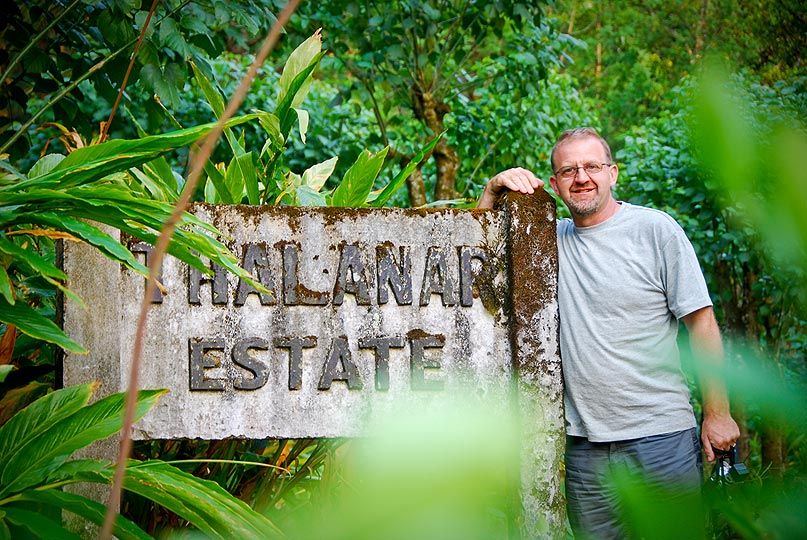 ndia Trip
ndia Trip
Thalanar Estate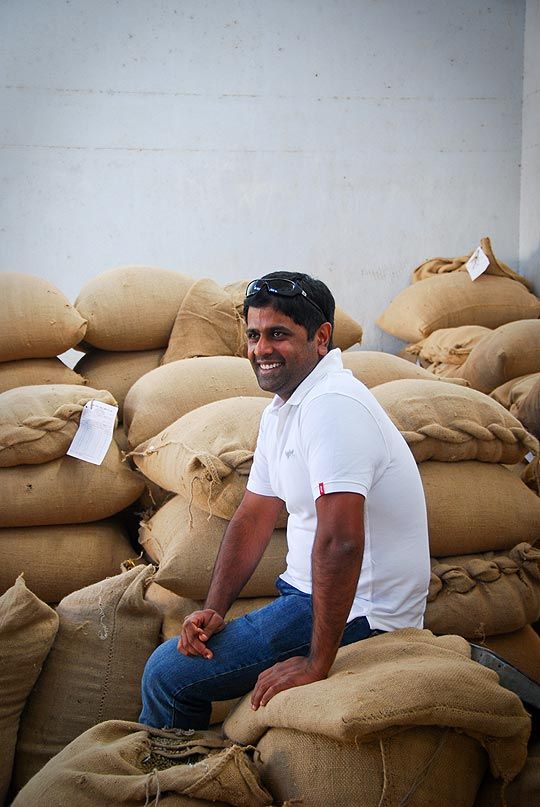
Plantation
Feb 2011
by Steve McGinness
This trip was the result of a chance 5 minute meeting in Melbourne between myself and Pathy Kasiviswanathan, Elephant Hills Coffee, resulting in a very rewarding trip to his family's home in Southern India.We were accompanied by Sean Edwards, Cafe Culture and Jay Beaumont, Focus Magazines.
The things that stood out to me were the very friendly and hospitable nature and the generosity of the people we met, particularly of their time. The ethical and eco-friendly approach of the Coffee industry at all levels from growing to processing.

Day 1
We travelled to Southern India to visit and stay on the Thalanar Coffee Esta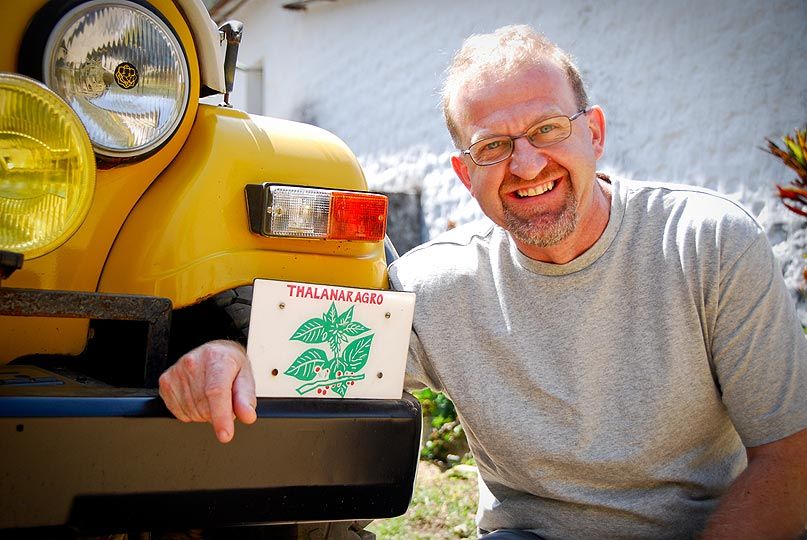 te. This was my first trip to India. We flew in to Coimbatore at about 11pm and were picked up by our gracious host Uncle Ravi and the plantation family. Then we made the one hour trip to Pollachi where we stayed our first night.
te. This was my first trip to India. We flew in to Coimbatore at about 11pm and were picked up by our gracious host Uncle Ravi and the plantation family. Then we made the one hour trip to Pollachi where we stayed our first night.
Day 2-4
After breakfast (doser with chili and lentils) we made the 1 1/2 hour drive up the mountains to the estate.
The plantation is located on the Anaimalai ranges (meaning Elephant hill in Tamil).
The plantation is at high altitude, between 3500 - 4500 feet or 1066 - 1500 Meters (above mid sea level), shade grown Arabica coffee. The trees, grown for shade, are Silver Oak, Mulberry, Jack fruit, Orange Trees etc. Along side coffee, close to the streams cardamom crops are planted to supplement revenue. Also growing is Pepper. The plantation has its own nursery to germinate coffee seedlings to replace bushes that are destroyed either by natural causes or wild animals, such as Bison and Elephants. The plantations sources water from the streams that run through the property and also natural springs.
We stayed on the beautiful shade grown coffee plantation in a valley between two mountain ranges for the next 3 days. The Thalanar Coffee Estate was established in 1959 and some of the original plants are still here bearing fruit. Many of the plants are now around 40 years old and still in their prime.
I was very impressed with how eco-aware India is, this focus is from Government level down through to the farmers and workers.
For example, if a tree needs to be removed or falls down, a Government official will photograph and tag the tree, then there will be tenders sought for the removal of the tree, should anyone chop down a tree or remove a tree without permission they face a jail term.
In the Thalanar Coffee Estate fresh spring water is used in the coffee pulping process bu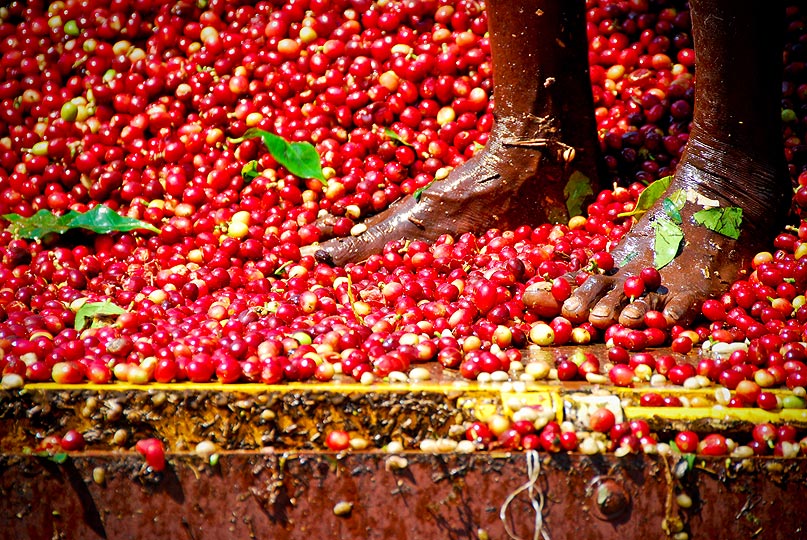 t then the water is channeled through four levels of sedimentation tanks to remove any acids from the water before it is released back into the stream.
t then the water is channeled through four levels of sedimentation tanks to remove any acids from the water before it is released back into the stream.
Another example is the way the waste cherry pulp is mixed with water, cow dung and cow urine, when it breaks down, this mixture is sprayed on the coffee plants as a fertilizer, the other benefit is that the smell keep the wild Bison off the plantation saving damage to the plants.On average up to 80 tonne of this "bio-waste" product is recycled annually.
Southern India is a very beautiful part of the world, and we were in the middle of a jungle. In the three days on the Estate, we saw wild bison, elephants, boar, several types of monkeys, snakes and the Malabah squirrels.
Although leopards are quite common, and I probably did something risky by putting my head so close to a known leopard cave (what was I thinking?), Uncle Ravi sees these beautiful creatures regularly and over the years has seen several tigers on the plantation.
This jungle reality really hits home when they close the gates around the home compound at night and turn on the 12 foot electric fence to keep out the elephants and bison!
As part of the care requirements for workers and their childre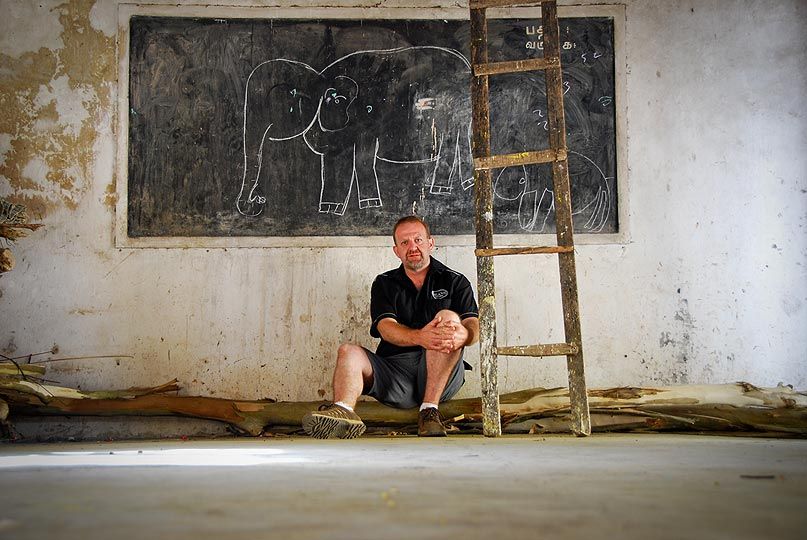 n, the plantation supplies accommodation, school and creche facilities. The government supplies teachers and each child is given a hot cooked meal each day.
n, the plantation supplies accommodation, school and creche facilities. The government supplies teachers and each child is given a hot cooked meal each day.
We very reluctantly left the beautiful Thalanar Coffee Estate and made our way back to Pollachi.
Day 4
It would have been remiss of us, when in India, not to talk about tea, so on the way back to Pollachi we made our way to the Waterfall Estate Tea Plantation, where we were lucky enough to have a private tour through the processing plant and their cupping room. Being a coffee person, I have to admit that the aroma and taste of the freshly picked and processed tea is amazing.
Back on the road to Pollachi we headed for the Thalanar Coffee Estate drying patios. We watched the workers turn the coffee, with their feet, this is quit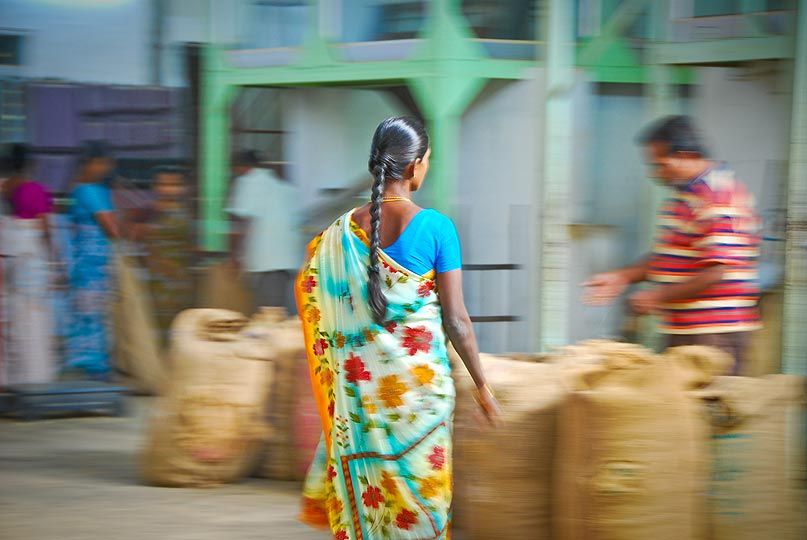 e different to other drying patios we have visited, where paddles or rakes have been used.
e different to other drying patios we have visited, where paddles or rakes have been used.
In the afternoon we went to Paulson's Coffee Curing Works, here we saw the coffee being mechanically graded and colour sorted and then finally hand sorted by the beautifully dressed women. It was really wonderful to see the bright colours amongst the drab hessian of the coffee bags.
Day 5
Did the tourist thing and went to the Topslide Tiger Reserve where we had an elephant ride through the jungle and visited the traditional mountain people who care for the elephants and make their home in a village within the reserve.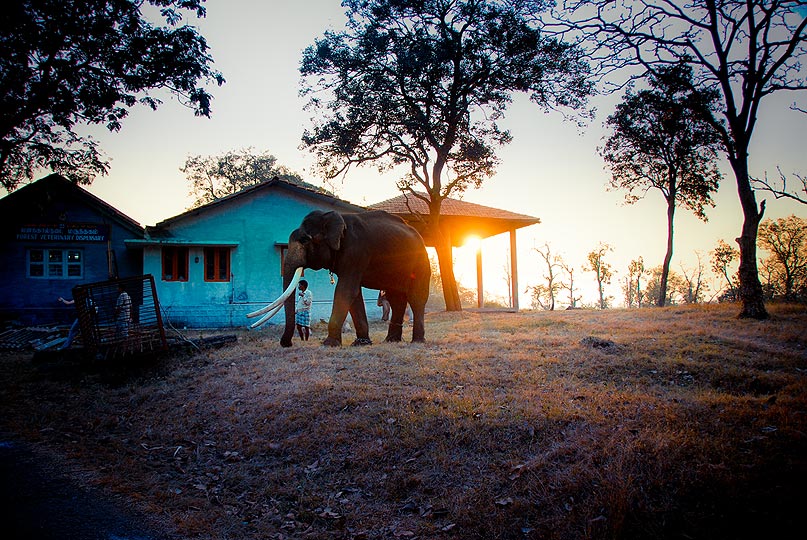
We then returned to the Ambraa Resort in Pollachi where we had lunch. This resort is set on 21 acres with perfect rows of coconut palms, and in between rows of cocoa plant, added to this is the river running through the back of the property making a very picturesque scene.
Day 6
Met Grandfather, (Mr k Angamuthu Mudaliar ) one of the original founders of the estate, with his late brother back in 1959. Now 91 years old he is still the respected head of the family.
Then we drove up through the mountains to Otty and lunched at The Savoy Hotel, continued driving on to Mudumalai and stayed at the Jungle Hut Safari.
Day 7
Up early and on safari, where we saw wild elephants, bison, boar, monkeys, deer and then finished the tour in a Robusta coffee plantation. The pickers ha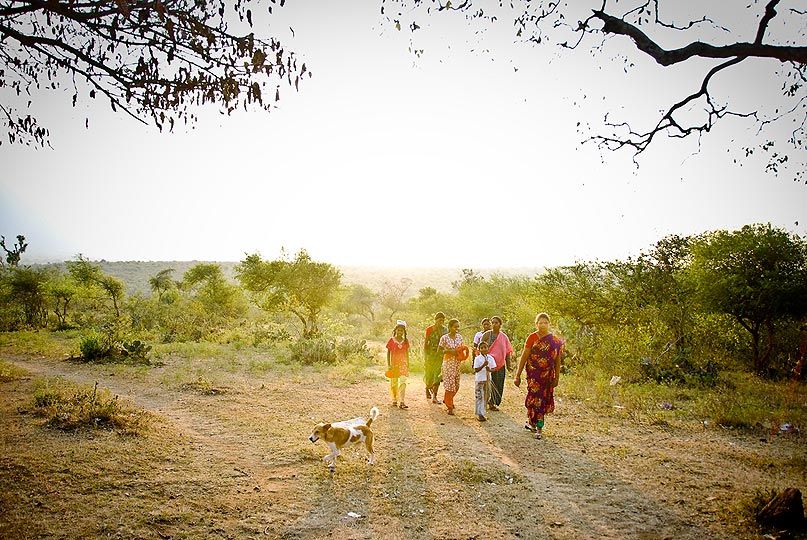 d to station a "spotter" in the trees to warn them of animals. One workplace where loud talking is encouraged! Our guide pointed out tiger tracks and scat and told us that a tiger had been sighted the night before - all we saw was the remaining limb of a spotted deer, only 200 or so metres from where the pickers were working.
d to station a "spotter" in the trees to warn them of animals. One workplace where loud talking is encouraged! Our guide pointed out tiger tracks and scat and told us that a tiger had been sighted the night before - all we saw was the remaining limb of a spotted deer, only 200 or so metres from where the pickers were working.
Day 8
Drove West through 3 states and all the spice growing areas of Coorg, after 10 ho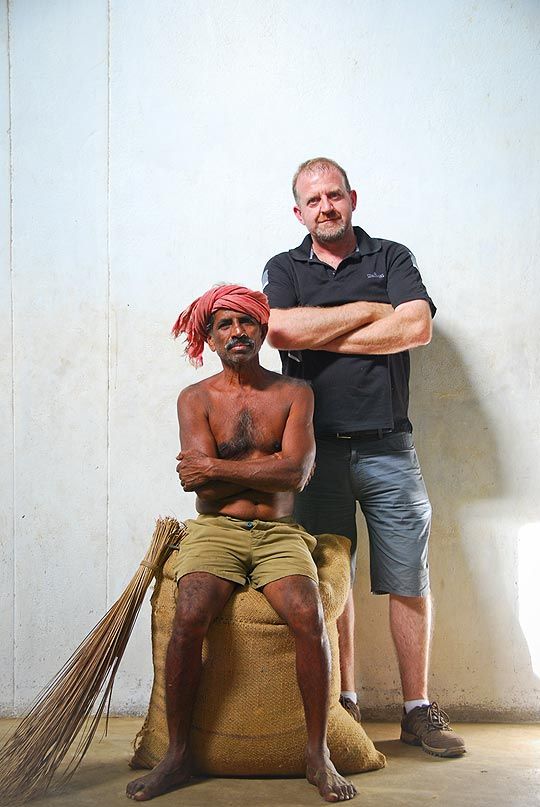 urs, we finally hit the West coast and Mangalore where we had a tour of the Monsooning plant. They have a huge warehouse where the green coffee beans are laid out about 15cm (6in) thick and the humid, moist, monsoon winds from the coast sweep across the coffee for 60 days, this causes the green coffee beans to swell and the salt in the air bleaches the coffee. The coffee is regularly turned during this process to ensure even moisture content, then half-bagged, this is done so the workers can tip the beans from bag to bag (again for moisture consistency) for another 60-80 days.
urs, we finally hit the West coast and Mangalore where we had a tour of the Monsooning plant. They have a huge warehouse where the green coffee beans are laid out about 15cm (6in) thick and the humid, moist, monsoon winds from the coast sweep across the coffee for 60 days, this causes the green coffee beans to swell and the salt in the air bleaches the coffee. The coffee is regularly turned during this process to ensure even moisture content, then half-bagged, this is done so the workers can tip the beans from bag to bag (again for moisture consistency) for another 60-80 days.
The coffee is then graded and processed as normal. This coffee is of course India's most recognised specialty coffee, the famous Monsoon Malabar.
Day 9
Drove through Chikmangalor and visited NKG Jayanti Coffee, a highly mechanized coffee processing plant, capable of processing 80 tonne of coffee per day.
We spent the afternoon at the Indian Coffee Board where we were very impressed with their training facilities. We spoke to the Coffee Quality Specialist during a break from one of the regular training sessions he was conducting for a group that included local farmers, he drove home the point that India has chosen very firmly to concentrate on quality.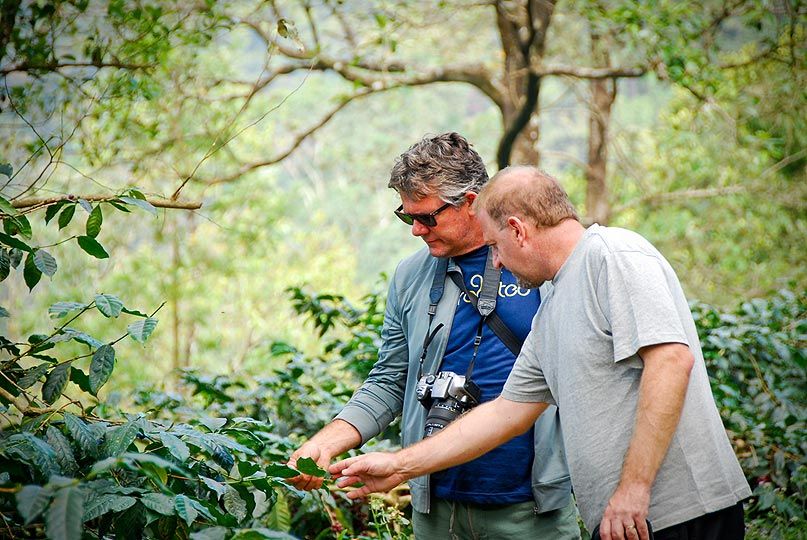
The principles of Karma - of what you put into the universe comes back to you - applies to how they care for their coffee industry, the Coffee Board promotes the principle of sacrifice: of quantity for quality. The training gives the farmers and plantation owners the skills to put these principles into practice.
We first saw this in action at the Thalanar Coffee Estate where the coffee is high altitude, shade grown, slow growing with a lower yield. The coffee is hand picked, with three passes per season, only the ripe cherries are taken each pass. The quality is exceptional.
That night we stayed at Wood-Way Coffee Estate. This 50 year old homestead in the middle of a coffee plantation with views of the mountain ranges, and as were were the only people staying there, had the place to ourselves. We sat around the camp fire with the owners and a few beers talking coffee late into the night.
Day 10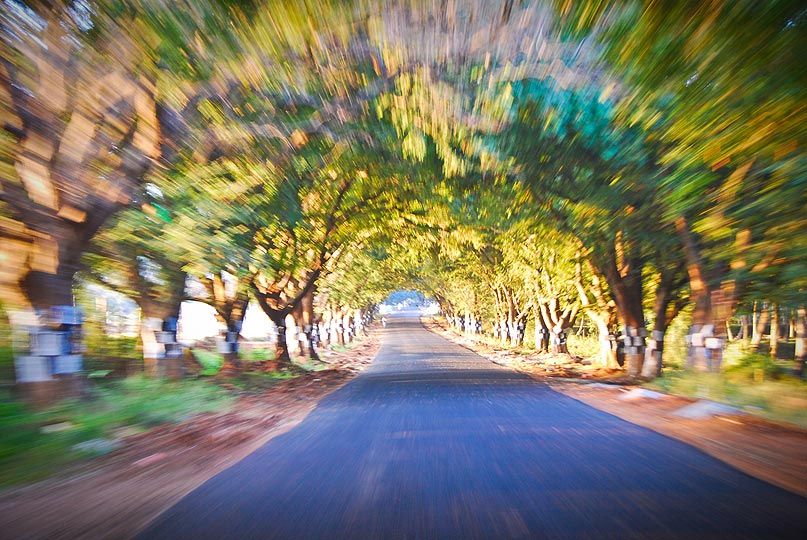
Another long drive where we arrived in Bangalore at peak hour along with the 25 million residents on the day the Australian Cricket team arrived for the start of the World Cup.
If you're thinking of going to India and getting off the main tourist tracks, there are many Home Stay options available, I highly recommend Southern India, great food, incredible scenery, wonderful, wonderful people.